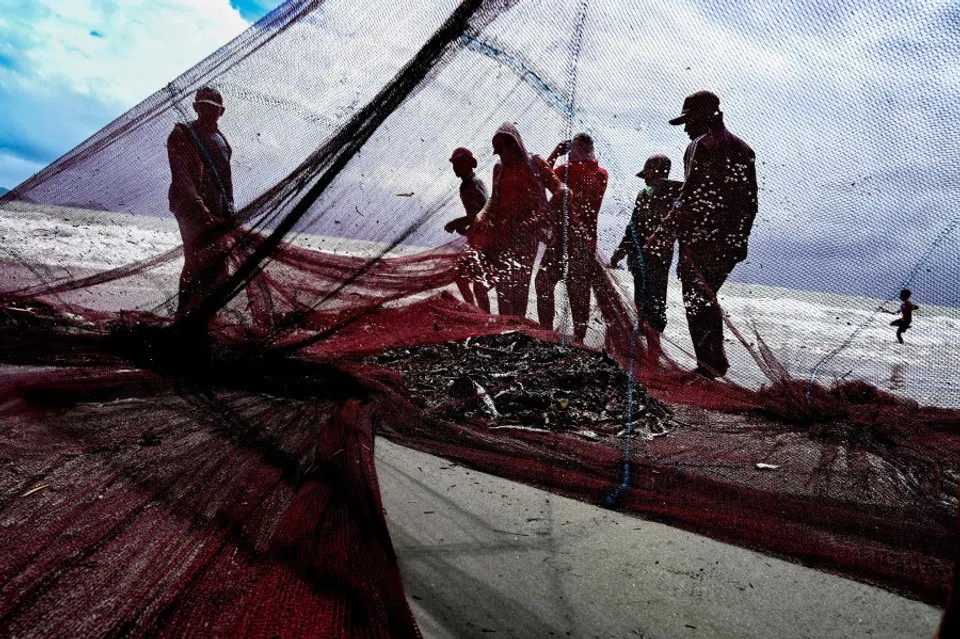Strong civilian presence needed to protect Indonesia's sovereignty in the North Natuna Sea
Indonesian academic Aristyo Rizka Darmawan notes the intrusions of Chinese vessels into Indonesia's Exclusive Economic Zone. He says to deter Chinese activities in the North Natuna Sea, Indonesia needs to complement its military assets in the area with a strong civilian presence.

A picture of Indonesian President Joko Widodo wearing a bomber jacket and standing next to a warship gun has become a famous picture in these last few years. It has been used by many media headlines, news articles, and even a cover for an academic book that examines Indonesian nationalism and sovereignty.
The picture was taken in late 2016. Then the president had led a small-scale cabinet meeting in a warship that sailed in the North Natuna Sea, after a Chinese fishing vessel had entered the Indonesian Exclusive Economic Zone (EEZ) illegally. He sought to send a message that the Jakarta government will take any violations of Indonesian sovereign rights seriously.
Five years on, however, the power of the bomber jacket image appears to have flamed out. Indonesia is still seeing the very same problem of the Chinese Coast Guard and even the People's Liberation Army Navy escorting Chinese fishing vessels or survey ships into Indonesia's EEZ. The image was quite successful in displaying nationalism to calm Indonesian citizens but it has failed to deter Beijing from sending its ships into Indonesia's EEZ.
Indeed, the North Natuna Sea for Indonesia is quite a complex issue. Even though Indonesia does not have any pending delimitation with China, Indonesia often sees escalation with China due to the latter's illegal nine-dash line claim to the South China Sea overlapping with the Indonesian EEZ.
Under UNCLOS, Indonesia has sovereign rights to explore and exploit its natural resources in its EEZ and continental shelf. UNCLOS Article 73 also gives Indonesia authority to enforce its national laws and regulations to any foreign vessels which illegally fish in the Indonesian EEZ without Indonesia's consent.
Therefore, after such incidents, Indonesia has always sent more coastguards (BAKAMLA) or even Navy warships to patrol in the North Natuna Sea. However, the patrols cannot be in the area throughout the year. Budgetary issues appear to be the main obstacle preventing a sustained military presence in the North Natuna Sea.
...it would be better for the government to support and equip local Natuna fishermen with larger vessels for use in the EEZ.

To deter Beijing from fishing and surveying illegally in the Indonesian EEZ, Indonesia needs to move beyond a military-focused strategy in the North Natuna Sea. Using a civilian presence to utilise all the natural resources in the area is fundamentally important. The North Natuna Sea and the Natuna islands are rich in natural resources such as fisheries, and high in mining potential.
Firstly, Indonesia has to increase the presence of its fishing vessels in the North Natuna. However, most Indonesian local fishermen in Natuna are mostly small-scale operators; sailing out to 200 nautical miles in the exclusive economic zone remains a challenge. To its credit, Indonesia has been trying to send a bigger fishing vessel from Java to catch fish in the North Natuna Sea. However, it seems that it is not very successful because it has created friction with the local fisherman in Natuna. As such, it would be better for the government to support and equip local Natuna fishermen with larger vessels for use in the EEZ.
To increase its activities in Natuna, Indonesia also must start to build the fishery industry there. The government should consider supporting local fishermen to expand markets overseas. Modern industries with more advanced technology will increase the area's export capacity and create jobs for local people.
Secondly, Indonesia should consider exploiting the area's huge potential for marine tourism, given its beautiful beaches and natural landscape. Under Tourism and Creative Industries Minister Sandiaga Uno, Indonesia is trying to revive the pandemic-hit tourism sector. On many occasions, the government has highlighted the tourism potential of the Natunas. But the infrastructure in the area is falling behind. The same applies to the number of flights, hotels and other forms of entertainment on the island. As the saying goes, once you build it, they will come. Indonesia has to build proper tourism infrastructure before promoting the Natunas to local and international tourist markets. This could involve roping in private-sector investors, whether from Indonesia or beyond.
The conduct of more marine scientific research in the area will help Indonesia discover the vast potential of marine resources and other biodiversity in the area.

Thirdly, Indonesia must increase its marine scientific research activities in the North Natuna Sea. It is beyond dispute that the area is Indonesia's EEZ; but evidence of consistent use and exploitation of the resources in the area will serve to deter Chinese forays into the area.
Last month, for example, China's Haiyang Dizhi Shihao 10 entered the Indonesian EEZ and conducted a survey or marine scientific research without Indonesian consent. Before such incidents happen again, Indonesia should conduct more scientific research in the North Natuna sea.
The infrastructure for such activity already exists, in the form of the newly established National Research and Innovation Agency (BRIN). The conduct of more marine scientific research in the area will help Indonesia discover the vast potential of marine resources and other biodiversity in the area.
Indonesia must implement its integrated ocean policy and build the infrastructure necessary to increase economic activity and presence in the area.
Lastly, there is also a case for exploring and exploiting the continental shelf of the North Natuna Sea, beyond the prescribed 200nm EEZ. Since 2016 the Ministry of Energy and Minerals has announced that it will increase such mining exploration and exploitation in the continental shelf. The increased utilisation of Indonesian resources in the continental shelf will also lead to a greater civilian presence in the area.
A military and diplomatic strategy alone in responding to any provocation and escalation from Beijing in the North Natuna Sea is not enough. Indonesia must implement its integrated ocean policy and build the infrastructure necessary to increase economic activity and presence in the area. A strong civilian presence in the area will serve to deter further Chinese forays into the area, and perpetuate the truth that the area is for Indonesia to exploit.
This article was first published by ISEAS - Yusof Ishak Institute as a Fulcrum commentary.
Related: Indonesian academic: China's recent foray into the North Natuna Sea is problematic | Recent Chinese moves in the Natunas rile Indonesia | Indonesia crosses swords with China over South China Sea: 'Bombshell to stop China's expansionism'? | [South China Sea] Pandemic and US-Japan support reasons for Indonesia's strong stance on SCS





